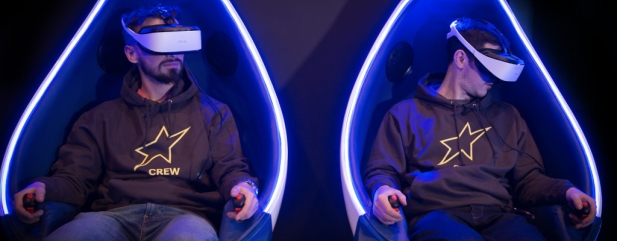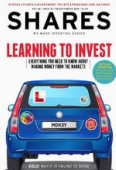Archived article
Please note that tax, investment, pension and ISA rules can change and the information and any views contained in this article may now be inaccurate.
Immotion looks to put some magic into leisure and shopping centres

Virtual reality (VR) hasn’t been the mainstream hit with consumers widely predicted a few years ago, despite equipment coming down in price and it being a fascinating experience.
There are a few obvious explanations such as the technology sometimes causing motion sickness, the price point still being too high for the mass market, and TV or online advertising failing to give viewers a chance to properly appreciate the experience of VR and entice them to buy the products.
What’s clear, however, is that VR is not going to be written off as a failed experiment. While it may not be omnipresent in the home for some time, if at all, VR may still have a future as a leisure experience in theme parks, shopping centres, museums and more. And that’s what Immotion (IMMO:AIM) is banking on.
The £26m company develops content to be used on a range of VR motion platforms which also house its bespoke content management system. These are being rolled out to big leisure operators such as Merlin Entertainments (MERL) and shopping centres, either as standalone shops or booths in the middle of malls owned by the likes of Hammerson (HMSO) and Intu (INTU).
From an investment perspective, Immotion is still early stage and loss-making. However, chief executive Martin Higginson says its shopping centre operations are all profitable (and expanding).
Higginson says the £5.75m raised at the stock market listing will ‘last the business to profitability’. Stockbroker WH Ireland forecasts maiden pre-tax profit of £0.1m in 2019, rising to £2.1m in 2020.
Some of Immotion’s development plans include the provision of a motion platform to clients free of charge in exchange for a revenue-share agreement. For that, the CEO says any working capital requirements might be funded through debt agreements rather than raising new money from shareholders.
THE CORPORATE STRATEGY
Immotion currently buys motion platforms from Chinese manufacturer Leke and adds its own content management system, a Windows 10 operating system and headsets from HP and Microsoft.
It then feeds these VR machines with content developed in-house such as experiences involving rollercoasters, horror scenarios, driving games and underwater exploration.
A direct-to-consumer proposition sees these machines placed in shopping centres, so far having a presence in four sites: Bristol, Manchester, Castleford and Cardiff. Further locations are expected to be announced shortly. Customers pay £5 for a five-minute experience.
The other way in which Immotion makes money is to either sell the machines outright to a third party and earn 50p per game play as a content royalty.
Or it strikes partnerships to supply a third party with a machine for free and earn a share of the revenue each time someone plays on the machine. This model enables Immotion to overcome the problems that often come with dealing with large companies where buying decisions can be lengthy procedures.
For example, gambling group Rank (RNK) is currently piloting the machines in its casinos and two Merlin-run Lego Discovery Centres in Boston (US) and Manchester have already signed up.
With the latter, visitors strap on a VR headset, sit in a pod that moves around and experience a 2.5 minute Lego-themed race.
‘Every week we are seeing increased usage and therefore higher revenue,’ says Higginson about the Merlin-located machines. ‘We believe it has added significant ancillary revenue to the Lego centres. The aim is to roll out the machines across other Merlin sites, but nothing is signed yet.’
The CEO says museums, aquariums and zoos have found it hard to increase footfall with numbers static over the past decade. Adding a VR machine is a proven way of increasing customer’s average spend per head, he argues, saying people are prepared to pay extra for the experience.
LOW PRICING POINT
Immotion has deliberately kept its price-point low in order to have mass market appeal. As a comparison, another firm called The Void is charging £35 in the US for whole-body, fully immersive VR experiences based on the Ghostbusters and Star Wars films. Higginson says the experience is great but many families can’t afford it and those that can may only do it once a year.
He wants Immotion’s customers to come back again and again and has recently started leaderboards in the shopping centres to encourage competition – and it is working.
The company’s own costs are kept low by sweating its asset such as a ‘build once, sell multiple times’ model. For example, it is developing a Jurassic experience and can edit the final version to tailor different markets. This might be focusing on the educational bits with a new voice-over for museums, or adding in a rollercoaster and more dinosaurs attacking the viewer if a client wants more thrills.
The CEO says the shopping centre model is being refined with a viewing to signing franchise agreements in the near future. Its platform sells for £15,000 retail and the sites often have four machines, so a total cost of £80,000 when also including displays and a till. ‘We believe a franchisee could put a £24,000 deposit down and earn a £50,000 to £60,000 salary.’
He says landlords are eager to have more VR pods as it brings a sense of excitement to their shopping centres and also gives consumers another reason to visit the shops.
Analysts predict Immotion could end 2018 with 200 motion platforms in action, rising to 1,000 next year. Hollywood studios have also been sniffing around, wanting to use Immotion to promote certain films via VR to offer a different experience to the cinema. Higginson says he only wants to enter into talks once Immotion has bigger scale.
‘The conversation would be more meaningful once we have 1,000 seats.’ By that point it could be serving 60,000 experiences a day or close to half a million per week. (DC)
Important information:
These articles are provided by Shares magazine which is published by AJ Bell Media, a part of AJ Bell. Shares is not written by AJ Bell.
Shares is provided for your general information and use and is not a personal recommendation to invest. It is not intended to be relied upon by you in making or not making any investment decisions. The investments referred to in these articles will not be suitable for all investors. If in doubt please seek appropriate independent financial advice.
Investors acting on the information in these articles do so at their own risk and AJ Bell Media and its staff do not accept liability for losses suffered by investors as a result of their investment decisions.

 magazine
magazine








